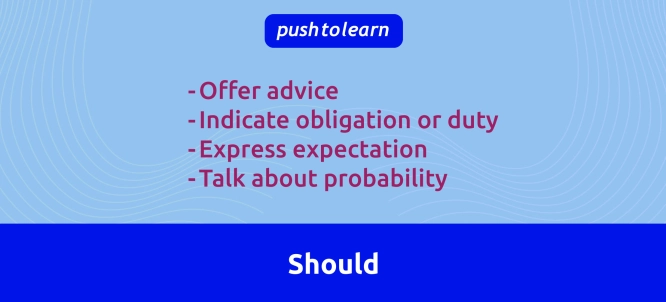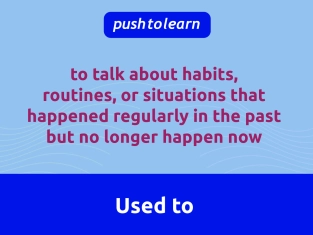by PushtoLearn
Modal Verb Should
Table of Contents
Modal Verb Should – Exercises
These exercises focus on Should
What is Should?
"Should" is a modal verb used to:
-
Offer advice
-
Indicate obligation or duty
-
Express expectation
-
Talk about probability
It is always followed by the base form of the verb (the infinitive without "to").

Uses of Should
1. Giving Advice or Suggestions
"Should" is often used to recommend or suggest something.
Examples:
-
You should eat more vegetables.
-
She should talk to her teacher about the problem.
2. Obligation or Duty
It can indicate that something is the right thing to do.
Examples:
-
You should apologize for being late.
-
We should follow the rules.
3. Expectation
Use "should" to express that something is expected or likely to happen.
Examples:
-
The train should arrive at 8:00 PM.
-
He should be home by now.
4. Probability
"Should" can also express probability when you believe something is true or likely.
Examples:
-
The exam should be easy if you studied.
-
It should rain tomorrow, according to the forecast.
Rules for Using Should
-
"Should" is always followed by the base form of the verb.
✅ Correct: You should exercise more.
❌ Incorrect: You should to exercise more. -
The negative form of "should" is "should not" or "shouldn’t".
✅ Correct: You shouldn’t skip breakfast.
❌ Incorrect: You don’t should skip breakfast. -
"Should" does not change with the subject.
✅ Correct: He should study. / They should study.
❌ Incorrect: He shoulds study.
Common Errors with Should
|
Error |
Why It’s Wrong |
Correct Form |
|
You should to call him. |
"To" is not needed after "should." |
You should call him. |
|
She shoulds go to school. |
"Should" does not take an "s." |
She should go to school. |
|
I don’t should drive now. |
Use "shouldn’t" instead of "don’t should." |
I shouldn’t drive now. |
|
Should you to work here? |
"To" is not needed in questions. |
Should you work here? |
Everyday Use of Should
Here are some examples of how to use "should" in different situations:
|
Situation |
Example Sentence |
|
Giving advice |
You should wear a jacket; it’s cold. |
|
Expressing obligation |
Drivers should stop at red lights. |
|
Talking about expectations |
He should be at the office now. |
|
Discussing probability |
This movie should be good. |
FAQ About Should
Can "should" be used for the past?
No, "should" refers to the present or future. For the past, use "should have" + past participle.
Example: You should have studied for the test.
What’s the difference between "should" and "must"?
-
"Should" is softer and used for advice or suggestions.
-
"Must" indicates a stronger sense of obligation or necessity.
Example: You should rest (advice). You must rest (necessity).
What is the negative form of "should"?
The negative form is "should not" or "shouldn’t".
Example: You shouldn’t skip meals.
Can "should" be used in questions?
Yes, you can form questions with "should" by placing it at the beginning of the sentence.
Example: Should I call her now?
Is "should" formal or informal?
"Should" is neutral and can be used in both formal and informal situations.

